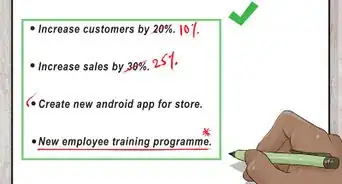This article was co-authored by Adrian Klaphaak, CPCC. Adrian Klaphaak is a career coach and founder of A Path That Fits, a mindfulness-based boutique career and life coaching company in the San Francisco Bay Area. He is also is an accredited Co-Active Professional Coach (CPCC). Klaphaak has used his training with the Coaches Training Institute, Hakomi Somatic Psychology and Internal Family Systems Therapy (IFS) to help thousands of people build successful careers and live more purposeful lives.
There are 8 references cited in this article, which can be found at the bottom of the page.
This article has been viewed 16,239 times.
Thinking about whether your current or future place of work allows you to be yourself and pursue your career aspirations is important and can help you decide whether a job is a good fit for you or not. To make this decision, you may also want to think about the culture of your current or future company. Deciding if a job is a good fit may begin with your job search but should also be on your mind during the interview process. In some cases, you may wish to return to this question and reevaluate long after you have started working at an organization.
Steps
Applying for Jobs
-
1Write down a list of everything you want in your next job.[1] Limit yourself to everything you can write on one page, and try to list at least one quality or characteristic you want in relation to salary expectations, supervisor characteristics, advancement, and the content of the job. You can rank the relative importance of each job characteristic by using a scale from one (highest priority) to ten (lowest priority).
- If your list has more than ten characteristics, you can continue ranking in ascending order from highest to lowest priority.
- For instance, you could write the number one beside the salary range you decide upon to indicate this characteristic as your number one priority.
-
2Decide what you want to be doing at your next job. Consider whether you want to be doing the same type of work you are currently doing or something a little different. If you are a carpenter and spent most of your time in your last position doing framing, consider whether you would like to be framing at your next job or if you would prefer to spend more time on finishing work, cabinetry, or other types of carpentry.Advertisement
-
3Set salary expectations. Reflect on the salary you want to be earning at your next job. Consider the salary you made in your last few positions and whether you want to be earning a similar or a higher salary.
-
4Determine supervisor characteristics. Think about the qualities you want to see in your next boss. Reflect on the qualities of your last supervisor and which of those qualities you would hope to find (or not) in your next supervisor.
- If your last supervisor offered little or poor feedback about your performance, consider whether you want your next supervisor to be more proficient in offering constructive feedback.
-
5Research advancement opportunities. Think about the opportunities for advancement or professional development you hope to see in your next position. Ponder whether there are specific areas of professional development that you would hope find at your next position, such as funding for professional conferences.
-
6Search for companies that value the qualities you are looking for.[2] Using the list of qualities and characteristics you have created, limit your job search to positions that have at least a good number of the qualities you desire. You can search for corporate values by looking at mission statements and “about us” pages on company websites or by talking to former or current employees at professional conferences and events.
- For example, you can look at mission statements on company websites. Reading the mission statements, search for keywords that relate to the values you are looking for such as “personal growth” or “professional development.”
- For example, if you want a job that values professional development opportunities, you should look for one that promotes this on their website.
- If you want one that values work-life balance, you should look for this quality on their website. [3]
-
7Figure out whether the corporate culture is a good fit for you. Whereas some companies do a lot to promote social relationships in the workplace with perks like weekend retreats, others have a more hands off approach. You should make sure the corporate culture is a good fit for what you want in your career and whether it fits your lifestyle.
- Explore the ‘About us’ or ‘Values’ pages of the company website. This should give you an initial sense of whether they value things that you are looking for in a company.[4]
- Explore the ‘Careers’ page on the organization website. This can help you figure out if the culture is a good fit for you.
- Set up a Google news alert for the company. This will help you get a sense of the values the company promotes to the public and how it is perceived in the news media.
- Think about the kind of work-life balance you need and whether the corporate culture will support that balance in your life.[5] Consider your current and future plans. For example, if you plan on having a child in the near future, then you might consider whether the company allows for telecommuting or flexible hours.
-
8Read about the company on review websites. Common review websites include Glassdoor and Vault.[6] If you find trends in the reviews that raise red flags for you, you might want to look elsewhere. At the same time, remember to take the reviews with a grain of salt. Many reviews may be written by either disgruntled or new employees.[7]
- Company review websites also often include information about similar companies that you might be interested in applying to.
-
9Look on their social media pages. Observe the values promoted in their Facebook posts and whether they align with your values. Next, look at profiles of people who work at the company on Linkedin. Decide whether these are people you would like to work with.[8]
- If you place a high value on work-life balance and you find a lot of posts that indicate the company values workhorse or nose to the grindstone type employees who work every weekend, perhaps the company values do not align with yours.
- If you value social and environmental sustainability and you cannot find any posts relating to sustainability, perhaps the company does not have the same values as you.
-
10Look for people who work at the company. Talking with other people who work at the company is one of the best ways to determine if it is a good place to work. Talk to them about the company to figure out if it is a good fit for you. If it seems like a good fit, you can use the contact to help you get ready for the big interview.[9]
- Ask them about what it’s like to work there, such as whether it is expected to work late and whether they give you free meals or other fringe benefits.[10]
- You might ask: How do you feel about the company? Do you feel like it offers good opportunities for advancement? Are you happy with how they treat you?
Deciding if a Job Interview Reveals a Good Match
-
1Ask questions during the interview. Remember that you can also ask questions during an interview. In particular, ask about who is successful at the company, and how you can gain access to the information that will allow you to be successful. Also ask them to describe their corporate culture for you.[11]
- At the interview, you might ask: Can you give an example of an especially successful employee at your company?
- You might also ask: What kind of corporate culture do you try to create here? What kinds of social supports do you offer employees? For instance, do you offer daycare?
-
2Figure out whether the job is a good fit for your motivational type. If you are mostly motivated by opportunities to move up in the organization, you should find out what kinds of rewards are offered for entrepreneurial employees. If you are motivated by a job with security, you should find out what the job offers in terms of long term benefits.[12]
- At the interview, you might ask: What kind of pension plan is offered with this position? What benefits are offered?
- You might also ask: What rewards do you offer for people who go above and beyond the weekly quota? What opportunities exist for professional development within the company?
-
3Look at your surroundings during the interview. Observe how people relate to one another and how they express themselves or not at the workplace.[13] Specifically, look to see if people are smiling at one another, listening to one another and respecting one another.
- Think about whether you see people being friendly to one another in the waiting room.
- Observe the demeanor of people you meet during the interview process. Reflect on whether you would see yourself as being happy in this environment.
- Even the layout of the furniture can give you an indication of the work culture. For example, if you see a lot of common areas with chairs and sofas for employees to gather, then the company likely values collaboration among its employees. However, if you see mostly cubicles, then the company likely values individual effort and does not encourage collaboration.
-
4Assess your experience of the interview. Think about how you were treated throughout the interview process and whether that treatment indicates that the company is a good fit for you.[14]
- You might ask yourself: Did the employer show respect for my time by starting the interview on time and notifying me of any changes or delays to the interview schedule?
- You might ask yourself: Did the employer show genuine interest in my responses and my experience?
- You might consider: Did the employer seem genuinely interested in my career goals and aspirations or were they just asking rote questions?
-
5Be wary of companies that use another company to do their hiring. Some companies use job placement agencies to get the majority of their employees and this may indicate that the company has a high turnover rate. If the turnover rate is high, then the company may not be a pleasant place to work.
- Even if the company does its own hiring, you may want to ask about the typical length of time that people stay with the company.
Figuring Out if Your Current Job is a Good Fit
-
1Reflect on whether you feel you are doing well at your job. If you feel like you are good at doing your job, this is a sign that it is at least partially a good fit. However, if you feel like nothing comes naturally to you at work, you may be in the wrong job.[15]
- Consider whether the tasks that you have to complete for your current job remain very difficult despite having had to complete them for many months or years.
- If you are a carpenter and find framing very difficult after many years of doing it, perhaps this job is not ideally suited to you. Perhaps other kinds of carpentry would be more rewarding.
- You can also check in with yourself every day before you go to work to see how you are feeling about it. For example, if you dread going to work every day, then this is a good indication that you should look for something different.
-
2Review the feedback that you have received at your current position. If you have received some positive feedback recently, this may be a sign that the job is a good fit for you. However, if you are constantly getting negative feedback at your position and experiencing very few rewards, the position may not be a good fit for you.[16]
- If you receive feedback from your boss orally, try to write down the feedback that you receive for a few months. At the end of a few months, review your notes and make a list of all of the areas needing improvement and all of the positive feedback. If the feedback is mostly negative or in the needing improvement area, you may need to consider other work.
-
3Examine whether the job allows you to be yourself. If you feel like you can be yourself at your job, this is a sign of a good fit. If you feel like you can’t be yourself at the workplace or your identity is marginalized, the job might not be a good fit.[17]
- If you are disabled, consider whether your employer takes steps to make this job and the workplace more accessible.
- If you are out in the workplace as part of the lesbian, gay, bisexual, transgender, queer or questioning (i.e., LGBTQ+) community, consider whether your employer has a LGBTQ+ employee resource group. LGBTQ+ resource groups share information on LGBTQ+ issues and events at the company and help connect LGBTQ+ identified people in the company.[18]
-
4Talk to friends and family about your job. If you enjoy chatting with your friends and family about your work and feel a spark of passion about work related subjects, this can be a sign of a positive match. If you really don’t like talking about your work, this may be an indication that your passion for the position has dwindled or was never there.[19]
- Bring up the subject of work at your next family event. If you find yourself enjoying the experience of talking about your current job, perhaps you are happy in your current position. However, if you find it painful or stressful to talk about, you should consider why the subject is so difficult to talk about.
-
5Ponder whether you are doing it for the money. It is fine if you are partly motivated by the money, but you should have other reasons for doing the work. If you are really just doing the job to make a buck, it might not be a good fit.[20]
- There are many people who manage to find work doing what they love, whatever that may be, so look around and try to find yourself a job doing something you are passionate about.[21]
- Consider what type of work you would like to do if money were not an issue. If you would still be doing your job or something similar, then this is a good indication that your job is a good fit for you. If you’d rather be doing something totally different, then you may want to look into changing fields.
Expert Q&A
-
QuestionHow do you know if a company is a good fit for you?
 Adrian Klaphaak, CPCCAdrian Klaphaak is a career coach and founder of A Path That Fits, a mindfulness-based boutique career and life coaching company in the San Francisco Bay Area. He is also is an accredited Co-Active Professional Coach (CPCC). Klaphaak has used his training with the Coaches Training Institute, Hakomi Somatic Psychology and Internal Family Systems Therapy (IFS) to help thousands of people build successful careers and live more purposeful lives.
Adrian Klaphaak, CPCCAdrian Klaphaak is a career coach and founder of A Path That Fits, a mindfulness-based boutique career and life coaching company in the San Francisco Bay Area. He is also is an accredited Co-Active Professional Coach (CPCC). Klaphaak has used his training with the Coaches Training Institute, Hakomi Somatic Psychology and Internal Family Systems Therapy (IFS) to help thousands of people build successful careers and live more purposeful lives.
Career Coach A job is most likely to be a good fit if it aligns with your values, strengths, passions, purpose, and personality type. To assess that, create a simple spreadsheet that scores the jobs that you're considering against each of those criteria, where a 1 represents no alignment and a 10 is full alignment. Then, total up your score for each career. You don't automatically have to choose the job that has the highest score, but the results can be very enlightening.
A job is most likely to be a good fit if it aligns with your values, strengths, passions, purpose, and personality type. To assess that, create a simple spreadsheet that scores the jobs that you're considering against each of those criteria, where a 1 represents no alignment and a 10 is full alignment. Then, total up your score for each career. You don't automatically have to choose the job that has the highest score, but the results can be very enlightening.
References
- ↑ https://www.thebalance.com/how-to-decide-if-a-job-is-a-good-fit-2061406
- ↑ https://www.topresume.com/career-advice/company-culture-job-match
- ↑ https://www.topresume.com/career-advice/company-culture-job-match
- ↑ http://lifehacker.com/how-to-find-out-if-a-company-is-a-cultural-fit-for-you-510587663
- ↑ https://www.thebalance.com/how-to-decide-if-a-job-is-a-good-fit-2061406
- ↑ https://www.thebalance.com/how-to-find-company-reviews-2060046
- ↑ http://lifehacker.com/how-to-find-out-if-a-company-is-a-cultural-fit-for-you-510587663
- ↑ http://lifehacker.com/how-to-find-out-if-a-company-is-a-cultural-fit-for-you-510587663
- ↑ https://www.topresume.com/career-advice/company-culture-job-match
- ↑ http://lifehacker.com/how-to-find-out-if-a-company-is-a-cultural-fit-for-you-510587663
- ↑ https://www.topresume.com/career-advice/company-culture-job-match
- ↑ http://www.forbes.com/sites/heidigranthalvorson/2013/04/18/the-surprising-key-to-finding-the-right-job-for-you/#3ad8156c6d9f
- ↑ https://www.topresume.com/career-advice/company-culture-job-match
- ↑ https://www.topresume.com/career-advice/company-culture-job-match
- ↑ http://www.forbes.com/sites/louisefron/2014/04/08/six-signs-youre-in-the-wrong-job/#1a47711123d1
- ↑ http://www.forbes.com/sites/louisefron/2014/04/08/six-signs-youre-in-the-wrong-job/#1a47711123d1
- ↑ http://www.forbes.com/sites/louisefron/2014/04/08/six-signs-youre-in-the-wrong-job/#1a47711123d1
- ↑ http://www.hrc.org/resources/advocating-for-lgbt-equality-in-your-workplace
- ↑ http://www.forbes.com/sites/louisefron/2014/04/08/six-signs-youre-in-the-wrong-job/#1a47711123d1
- ↑ http://www.forbes.com/sites/louisefron/2014/04/08/six-signs-youre-in-the-wrong-job/#1a47711123d1
- ↑ http://www.forbes.com/sites/louisefron/2014/04/08/six-signs-youre-in-the-wrong-job/#1a47711123d1
















































































